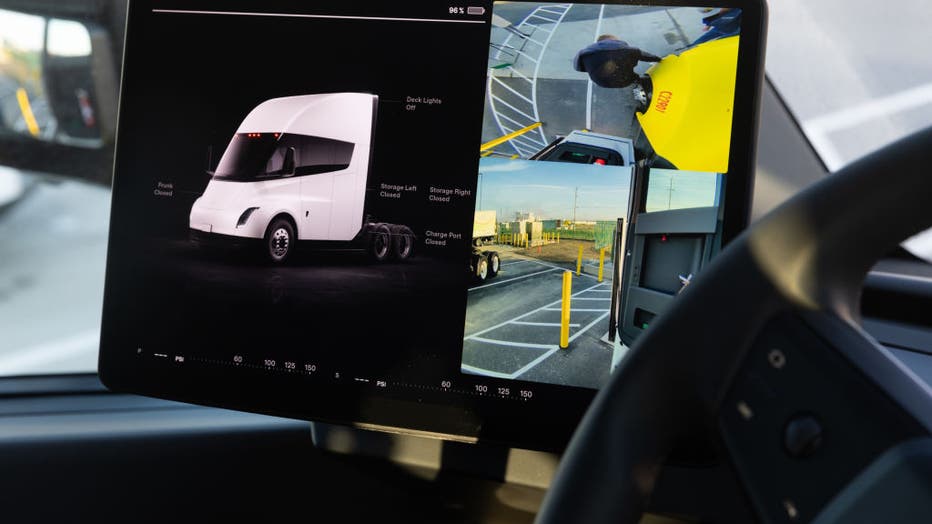NTSB investigating Tesla Semi crash in Northern California
The National Transportation Safety Board is teaming up with the California Highway Patrol to investigate a crash involving a Tesla Semi in Northern California on Monday. The Tesla big-rig crash triggered a hazardous materials incident in the area that delayed traffic for some time.
Interstate 80 near Colfax was closed in both directions after Tesla's electric big-rig model crashed into trees off the shoulder of the roadway at around 3:15 a.m. Monday, CHP said.
The Tesla Semi is a big rig released by the tech giant. All Tesla Semis come with supported autopilot features, but, at this time, they are operated with a driver in the seat.
Tesla Semis do not currently utilize the company's Advanced Driver Assistance Systems (ADAS). The big rigs have the hardware to support ADAS, but the company is still building out software for the trucks, per a report from Forbes.

A touchscreen tablet inside a Tesla Semi electric truck parked outside the Frito-Lay manufacturing facility in Modesto, California, US, on Wednesday, Jan. 18, 2023. PepsiCos Frito-Lay is replacing its diesel-powered freight equipment with zero-emissi (Benjamin Fanjoy/Bloomberg via Getty Images)
As of late 2023, Tesla Semis were not available to all consumers. The NTSB investigation could spell trouble for Tesla's goals to expand production and increase consumption of the big rig.
For some time, PepsiCo. was the only known company operating Tesla Semis on United States roadways. Tesla's VP of Vehicle Engineering, Lars Moravy and Tesla Design Chief Franz von Holzhausen discussed the plans for Tesla's Semi on an episode of Jay Leno's Garage in 2023.
"We have close to 100 Semis on our fleet now, and they’re doing that run, and we’re working with Pepsi as well, to just understand the durability and get it right so we can go into volume production next year," Moravy said.
The crash comes not long after the company announced partnerships with Costco, Sysco and US Foods. Drivers reportedly spotted the big rigs on California roadways.
Only a few self-driving companies are approved to operate big rigs on U.S. roadways, including PlusAI and Aurora Innovation. The companies have different approaches: PlusAI operates a driver-in system, which is already being tested on U.S. roads and used by some consumers. Plus is also developing fully self-driving technology.
Aurora Innovation is developing fully self-driving tech as well, and the company is also testing full-self-driving tech without a driver in controlled testing environments. No company working on self-driving technology for big rigs is currently approved to test their systems on U.S. roads without a driver behind the wheel.
Tesla's autopilot features have received several criticisms after being involved in several accidents investigated by the National Highway Traffic Safety Administration.
The crash also comes as consumers have grown generally hesitant about self-driving tech. A poll conducted in January by AAA found that a decisive majority of American drivers — 66% — said they would fear riding in an autonomous vehicle.
Squatters living in abandoned SF building and a Fillmore District restaurants forced to close: Today News | KTVU
Breaking news, weather, and traffic from across the Bay Area to start your day.
For years, it seemed as though the initial venture for autonomous vehicles would be ride-hailing services in large cities. But General Motors’ Cruise robotaxi unit is struggling after a serious crash. Alphabet’s Waymo faces opposition to expanding its autonomous ride service in California. The result is that self-driving trucks are poised to become the first computer-controlled vehicles deployed in widespread numbers on public roads.
The vehicles have drawn skepticism from safety advocates, who warn that with almost no federal regulation, it will be mainly up to the companies themselves to determine when the semis are safe enough to operate without humans on board.
How did the Tesla Semi crash result in a hazardous materials incident?
Authorities say after the crash, the Tesla Semi's battery ignited and sparked a raging fire that spewed toxic fumes, authorities said.
Interstate 80 near Colfax was closed in both directions after Tesla's electric big-rig model crashed into trees off the shoulder of the roadway at around 3:15 a.m. Monday, California Highway Patrol (CHP) said.
Officials said the semi-driver walked away from the crash and was taken to a hospital.
The Tesla’s battery burned at around 1,000 degrees, and firefighters used "thousands and thousands" of gallons of water in attempts to cool the wreckage, CHP Officer Jason Lyman told KCRA-TV.
Lyman said that firefighters had to ultimately wait for the lithium-ion batteries to die and burn themselves out and cool to a temperature of 100 degrees. Toxic fumes from the battery also presented a danger if inhaled, he said.
A plane dropped fire retardant in the area surrounding the semi to prevent the flames from spreading to nearby trees. Tesla also sent a Hazmat crew to the scene.
Lyman said that electric big rig fires are a "newer thing" that fire officials are still learning how to confront.
The Associated Press and Fox Business contributed to this report.

